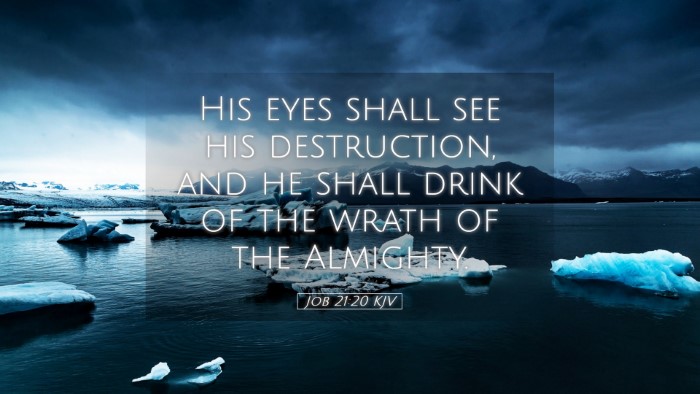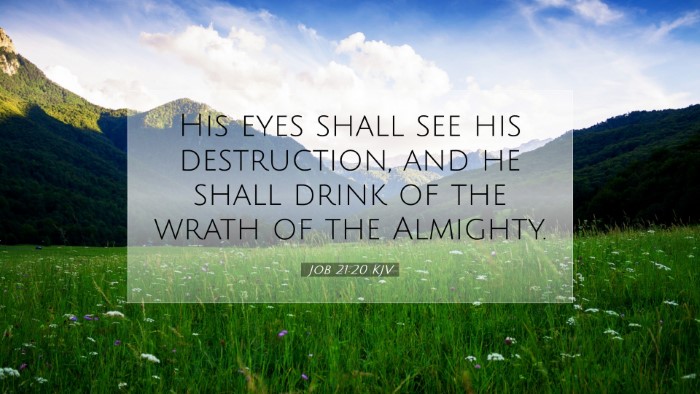Bible Commentary on Job 21:20
Introduction
Job 21:20 is a pivotal verse within the discourse of Job's responses to his friends, encapsulating the struggle of understanding divine justice amidst human suffering. Job speaks directly to the preconceptions of righteousness and retribution held by his friends. This passage, reflecting deep theological concern, illustrates the disparity between the perceived norms of reward for the righteous and punishment for the wicked. The verse serves as a challenge to established beliefs regarding morality and divine justice.
Text of Job 21:20
"Let his own eyes see his destruction, And let him drink of the wrath of the Almighty."
Exegesis
This verse is a direct expression of Job’s assertion that the wicked do see the fruits of their actions, countering the belief that the wicked are invariably punished in their lifetimes. Job's challenge reveals his realization that life is often inconsistent with the anticipations of divine justice as perceived by man.
Insights from Matthew Henry
Matthew Henry emphasizes how Job's declaration exposes the folly of presuming to judge God's providences based purely on visible outcomes. He suggests that Job’s friends failed to comprehend God's ways, mistaking temporal success as a sign of divine favor and suffering as a sign of divine disfavor. Henry underscores the paradox Job poses: that the judgment of the wicked can sometimes be postponed or unrecognized in life, encouraging believers to wait patiently for ultimate justice.
Insights from Albert Barnes
Albert Barnes provides an analytical view on this verse, noting that Job points out the harsh reality that even the wicked can live out their lives enjoying worldly gains without immediate divine retribution. Barnes provides commentary on the phrase "let him drink of the wrath of the Almighty,” suggesting that it serves as a metaphor for the ultimate judgment that awaits the ungodly. He discusses how Job's assertion impacts the understanding of divine justice, suggesting it operates beyond human timelines and perceptions.
Insights from Adam Clarke
Adam Clarke elaborates on the theological implications of Job's statement. His commentary reveals the emotional depth of Job's lament, indicating that Job is not only making a point about justice but expressing his anger and frustration towards his condition compared to that of the wicked. Clarke explores how this dichotomy between the apparent prosperity of the wicked and the suffering of the righteous raises critical questions about the rationale behind divine governance.
Theological Reflections
This verse evokes critical theological reflection on the nature of God in relation to human suffering. It poses important questions about faith, justice, and the human understanding of divine intervention. The exploration of this verse can lead to discussions on:
- The nature of divine justice: The tension between immediate earthly justice and ultimate divine justice is a recurring theme in theology.
- Theodicy: How can a just God allow the righteous to suffer while the wicked appear to prosper?
- Faith amid suffering: Job’s response reflects a profound confidence in God’s ultimate justice, encouraging believers to maintain faith even when outcomes seem unfair.
Practical Application
For pastors, theologians, and students of theology, Job 21:20 invites the exploration of how believers are to respond to apparent injustices in the world. A few practical applications include:
- Encouragement in suffering: Remind congregations that suffering does not mean abandonment by God, nor does it reflect one's standing before Him.
- Engagement with doubt: Encourage open discussions about doubts and struggles with faith in the face of life's inequities.
- Hope for justice: Reiterate that ultimate justice will be served in God’s time, encouraging hope in His faithfulness.
Conclusion
Job 21:20 is not merely a statement about the fate of the wicked, but a theological reflection that calls for deeper understanding of God’s providence amidst human suffering. Through the insights shared by Matthew Henry, Albert Barnes, and Adam Clarke, one can grasp the profound challenges posed by this text. It serves as a beacon that guides faithful hearts through periods of darkness, affirming that God's justice transcends human understanding and that divine timing is not always aligned with human expectations.


